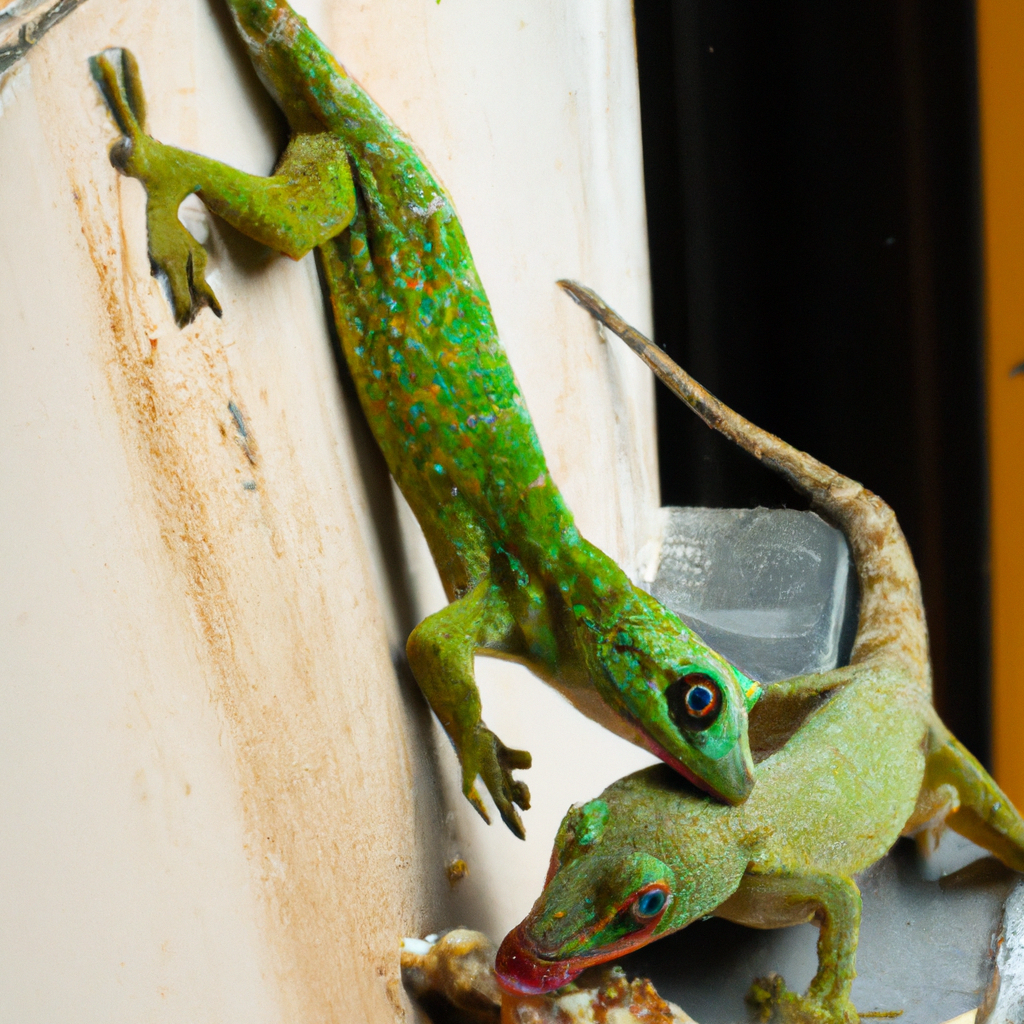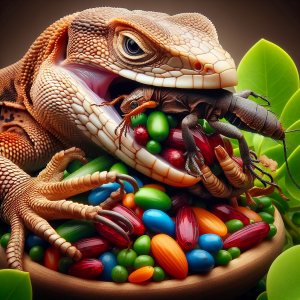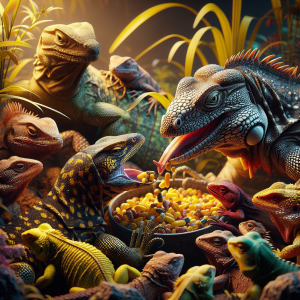Introduction
In the world of reptiles, lizards are a diverse and fascinating group of animals. From the tiny geckos to the mighty Komodo dragons, lizards come in a wide range of shapes, sizes, and species. As a lizard owner, it is important to understand the lizard Diet and nutrition needs and nutritional requirements of these unique creatures to ensure their overall health and well-being.
Proper nutrition is crucial for lizards as it directly impacts their growth, development, and immune system. A well-balanced diet provides the necessary energy, vitamins, minerals, and other essential nutrients that lizards need to thrive. However, it is important to note that the specific dietary needs can vary depending on the species of lizard.
Lizards are primarily carnivorous, insectivorous, or herbivorous, with some species being omnivorous. This means that their diet can consist of a variety of foods, including insects, fruits, vegetables, and even small mammals or other lizards. Understanding the specific dietary requirements of your lizard species is essential to ensure they receive the appropriate nutrients.
Feeding frequency is another important aspect of lizard nutrition. While some lizards may require daily feedings, others may only need to be fed a few times a week. It is important to research and understand the feeding habits of your specific lizard species to establish a feeding schedule that meets their needs.
Essential nutrients for lizard health include calcium, vitamin D3, and protein. Calcium is crucial for bone health and proper muscle function, while vitamin D3 aids in calcium absorption. Protein is essential for growth and development. It is important to provide a varied diet that includes these essential nutrients to prevent deficiencies and promote optimal health.
Different lizard species may have specific dietary considerations. For example, herbivorous lizards may require a diet rich in leafy greens and vegetables, while insectivorous lizards may need a diet high in insects. Understanding the specific dietary needs of your lizard species will help ensure they receive the appropriate nutrition.
In conclusion, understanding the dietary needs and nutritional requirements of lizards is essential for their overall health and well-being. By providing a well-balanced diet that meets their specific needs, you can help your pet lizard thrive and live a long and healthy life.
Understanding Lizard Diet and Nutrition
Understanding the Lizard diet and nutrition needs of lizards is crucial for their overall health and well-being. Lizards are ectothermic animals, meaning their body temperature is regulated by their environment. This affects their metabolism and digestion, making their dietary requirements unique compared to other animals.
Lizards are primarily insectivores, meaning their diet consists mainly of insects. However, some species of lizards are omnivores and may also consume fruits, vegetables, and even small vertebrates. It is important to research the specific dietary needs of your lizard species to ensure you are providing them with the appropriate food.
In addition to the types of food, the size of the food items is also important. Lizards have different feeding habits and mouth structures, so it is essential to provide appropriately sized prey or food items. Feeding them food that is too large can lead to choking or digestive issues.
The frequency of feeding also varies depending on the species and age of the lizard. Juvenile lizards generally require more frequent feedings compared to adult lizards. It is recommended to feed juvenile lizards daily, while adult lizards may only need to be fed every few days. However, it is important to monitor their weight and adjust the feeding schedule accordingly to prevent overfeeding or underfeeding.
Lizards require a variety of essential nutrients for their overall health. These include proteins, vitamins, minerals, and calcium. Calcium is particularly important for lizards as it is necessary for proper bone growth and preventing metabolic bone disease. It is crucial to provide a balanced diet that includes a variety of food items to ensure they receive all the necessary nutrients.
Different species of lizards may have specific dietary considerations. For example, herbivorous lizards may require a diet rich in leafy greens and vegetables, while carnivorous lizards may need a diet high in protein. Researching the specific dietary needs of your lizard species is essential to provide them with the optimal nutrition they require.
In conclusion, understanding the Lizard diet and nutrition needs of lizards is essential for their overall health and well-being. Providing them with the appropriate types of food, feeding frequency, and essential nutrients is crucial. Researching the specific dietary considerations for your lizard species and avoiding common mistakes in lizard nutrition will help ensure you are providing optimal nutrition for your pet lizard.
Types of Food for Lizards
When it comes to the diet of lizards, it’s important to provide a variety of foods to ensure they receive all the essential nutrients they need to thrive. Lizards are omnivorous, meaning they eat both plant and animal matter, so their diet should reflect this. Here are some common types of food that are suitable for lizards:
1. Insects: Insects are a staple in the diet of many lizard species. Crickets, mealworms, and roaches are popular choices, as they are high in protein and easy to digest. It’s important to gut-load insects before feeding them to your lizard, which means feeding them a nutritious diet so that they, in turn, provide essential nutrients to your lizard.
2. Vegetables: Leafy greens, such as kale, collard greens, and dandelion greens, are excellent sources of vitamins and minerals for lizards. Other vegetables, such as squash, carrots, and bell peppers, can also be offered to provide a variety of nutrients.
3. Fruits: Fruits should be offered in moderation, as they are high in sugar. However, small amounts of fruits like berries, mango, and papaya can be a tasty and nutritious addition to a lizard’s diet.
4. Commercial Diets: There are also commercial diets available for lizards, such as pelleted food or canned diets. These can be convenient options, but it’s important to supplement them with fresh foods to ensure a well-rounded diet.
5. Calcium and Vitamin Supplements: Lizards require calcium and vitamin supplements to prevent deficiencies and maintain overall health. Dusting insects with calcium powder or providing a calcium supplement can help meet these needs.
It’s important to research the specific dietary requirements of your lizard species, as different species may have different preferences and nutritional needs. Additionally, it’s crucial to avoid feeding lizards toxic or harmful foods, such as insects that have been exposed to pesticides or plants that are toxic to reptiles.
By offering a diverse range of foods and ensuring that their nutritional needs are met, you can help your pet lizard stay healthy and thrive.
Feeding Frequency for Lizards
Feeding frequency is an important aspect of the lizard diet and nutrition. The frequency at which you feed your pet lizard will depend on its species, age, size, and activity level. It is crucial to provide them with regular meals to ensure their overall health and well-being.
For most lizards, feeding them every day or every other day is recommended. However, some species may require more frequent feedings, while others may need to be fed less often. It is essential to research the specific dietary needs of your lizard species to determine the appropriate feeding frequency.
Younger lizards generally have higher metabolisms and growth rates, so they may require more frequent feedings compared to adult lizards. It is important to monitor their growth and adjust their feeding schedule accordingly.
When it comes to the quantity of food, it is crucial not to overfeed or underfeed your lizard. Overfeeding can lead to obesity and other health issues, while underfeeding can result in malnutrition and stunted growth. It is recommended to feed your lizard an amount of food that they can consume within 10-15 minutes.
In addition to the frequency of feedings, it is also important to consider the timing of the meals. Most lizards are diurnal, meaning they are active during the day. Therefore, it is best to feed them during daylight hours when they are most active and alert.
It is important to provide a varied diet for your lizard to ensure they receive all the necessary nutrients. This can include a combination of live insects, such as crickets, mealworms, and waxworms, as well as fresh fruits and vegetables. Some lizards may also require additional supplements, such as calcium and vitamin D3, to support their bone health.
In conclusion, feeding frequency is a crucial aspect of lizard diet and nutrition. It is important to research the specific dietary needs of your lizard species and provide them with regular meals to ensure their overall health and well-being. Monitoring their growth and adjusting their feeding schedule accordingly is essential. Additionally, providing a varied diet and considering the timing of the meals can contribute to a balanced lizard diet.
Essential Nutrients for Lizard Health
Lizards, like all living creatures, require a variety of essential nutrients to maintain their health and well-being. Understanding the specific nutritional needs of your pet lizard is crucial in ensuring that they receive a balanced and healthy diet. Here are some of the essential nutrients that are important for the health of lizards:
1. Protein: Protein is essential for the growth and development of lizards. In the wild, lizards consume a diet that is high in protein, often consisting of insects and small animals. When keeping lizards as pets, it is important to provide them with a source of high-quality protein, such as live insects or commercially available insect-based diets.
2. Calcium: Calcium is crucial for the development and maintenance of strong bones and overall skeletal health in lizards. A lack of calcium can lead to metabolic bone disease, a serious and potentially fatal condition in lizards. To ensure that your pet lizard receives an adequate amount of calcium, it is important to provide them with calcium-rich foods, such as dark leafy greens, and to dust their food with a calcium supplement.
3. Vitamins: Lizards require a variety of vitamins, including vitamin A, vitamin D, and vitamin E, to support their overall health and immune function. These vitamins can be obtained through a balanced diet that includes a variety of fruits and vegetables, as well as through exposure to natural sunlight or the use of UVB lighting.
4. Water: Adequate hydration is essential for the health of lizards. It is important to provide your pet lizard with access to clean, fresh water at all times. Some lizards may also benefit from regular misting to maintain proper hydration levels.
By understanding and providing these essential nutrients, you can help ensure that your pet lizard receives the nutrition they need to thrive and live a healthy life. Always consult with a veterinarian or reptile specialist for specific dietary recommendations for your particular species of lizard.
Dietary Considerations for Different Lizard Species
When it comes to the dietary needs of lizards, it’s important to understand that different species have different requirements. While some lizards are omnivorous and can eat a variety of foods, others are strictly herbivorous or carnivorous. Therefore, it is crucial to provide the appropriate diet for your specific lizard species to ensure their optimal health and well-being.
For herbivorous lizards, such as iguanas and bearded dragons, a diet rich in leafy greens and vegetables is essential. These lizards require a high-fiber diet to aid in digestion and prevent constipation. Some suitable food options for herbivorous lizards include collard greens, kale, dandelion greens, and squash. It is important to provide a variety of vegetables to ensure a well-rounded diet.
On the other hand, carnivorous lizards, such as leopard geckos and monitor lizards, require a diet consisting mainly of insects and small vertebrates. These lizards have a higher protein requirement and need a regular supply of live prey. Crickets, mealworms, and small mice are commonly fed to carnivorous lizards. It is important to ensure that the prey items are appropriately sized for the lizard to prevent choking or digestive issues.
Some lizards, like the omnivorous blue-tongued skink, have a more flexible diet and can eat both plant matter and small animals. These lizards benefit from a combination of leafy greens, vegetables, fruits, and insects. It is important to strike a balance between plant-based and animal-based foods to meet their nutritional needs.
In addition to the specific food requirements, it is important to consider the size and age of your lizard when determining the appropriate diet. Juvenile lizards may require more frequent feedings and a higher protein intake compared to adult lizards. It is also important to provide a calcium supplement to prevent calcium deficiency and metabolic bone disease, which is common in reptiles.
In conclusion, understanding the dietary considerations for different lizard species is crucial for providing optimal nutrition for your pet lizard. By tailoring their diet to their specific needs, you can ensure their overall health and well-being. Consulting with a reptile veterinarian or doing thorough research on your lizard’s species-specific dietary requirements is highly recommended to ensure you are providing the best diet for your pet lizard.
Potential Health Issues Related to Lizard Diet
Proper nutrition is crucial for the overall health and well-being of lizards. However, an improper diet can lead to various health issues in these reptiles. It is important for lizard owners to be aware of these potential health problems and take necessary precautions to prevent them.
One common health issue related to lizard diet is nutritional deficiencies. Lizards require a balanced diet that provides them with all the essential nutrients they need. If their diet lacks certain nutrients, it can lead to deficiencies that can have serious consequences. For example, a lack of calcium can result in metabolic bone disease, which weakens the bones and can lead to deformities and fractures. Vitamin deficiencies can also cause problems with the immune system, skin, and overall growth and development.
Another potential health issue is obesity. Lizards that are overfed or fed a diet high in fat can become overweight. Obesity can lead to a range of health problems, including heart disease, liver disease, and joint issues. It is important for lizard owners to monitor their pet’s weight and ensure they are not overfeeding them.
Inadequate hydration is another concern when it comes to lizard diet. Lizards require access to fresh water at all times to stay properly hydrated. Dehydration can lead to a variety of health issues, including kidney problems and difficulty shedding their skin.
Additionally, some lizards have specific dietary requirements that need to be met in order to prevent health problems. For example, certain species of lizards, such as herbivorous ones, require a diet high in leafy greens and vegetables. Feeding them a diet that is too high in protein can lead to digestive issues and other health complications.
To prevent these potential health issues, it is important for lizard owners to educate themselves about the specific dietary needs of their pet lizard. They should consult with a veterinarian or reptile specialist to ensure they are providing a balanced and appropriate diet. It is also important to monitor the lizard’s health and behavior regularly and make adjustments to their diet as needed.
In conclusion, understanding the potential health issues related to lizard diet is essential for providing optimal nutrition for these reptiles. By ensuring a balanced and appropriate diet, lizard owners can help prevent nutritional deficiencies, obesity, dehydration, and other health problems. Taking the time to research and educate oneself about lizard nutrition is crucial for the well-being of these fascinating creatures.
Tips for a Balanced Lizard Diet
Maintaining a balanced diet is crucial for the overall health and well-being of your pet lizard. Here are some tips to ensure that your lizard receives the necessary nutrients for optimal nutrition:
1. Variety is key: Lizards, like humans, require a diverse diet to meet their nutritional needs. Offer a variety of food items to ensure that your lizard receives a wide range of nutrients. This can include insects, such as crickets, mealworms, and waxworms, as well as fruits and vegetables.
2. Gut-loading insects: If you feed your lizard insects, it is important to gut-load them before offering them as food. Gut-loading involves feeding the insects with nutritious foods, such as leafy greens or commercial gut-loading diets, to enhance their nutritional value. This ensures that your lizard receives the maximum benefit from the insects it consumes.
3. Calcium and vitamin supplementation: Lizards require adequate amounts of calcium and vitamins to maintain healthy bones and overall health. Dusting the food items with a calcium and vitamin supplement is recommended, especially for lizards that primarily consume insects. This helps prevent calcium deficiency and related health issues, such as metabolic bone disease.
4. Avoid feeding toxic foods: Some foods can be toxic to lizards and should be avoided. This includes foods like avocado, rhubarb, and onions. It is important to research and familiarize yourself with the specific dietary restrictions of your lizard species to ensure their safety.
5. Monitor feeding frequency: The feeding frequency for lizards can vary depending on their species, age, and size. It is important to research the specific needs of your lizard species and adjust the feeding frequency accordingly. Overfeeding can lead to obesity and other health issues, while underfeeding can result in malnutrition.
6. Hydration: Lizards also require access to fresh water for hydration. Ensure that your lizard has a clean water source available at all times. Some lizards may also benefit from occasional misting or soaking to maintain proper hydration levels.
By following these tips, you can provide a balanced and nutritious diet for your pet lizard. Remember to consult with a reptile veterinarian or specialist for specific dietary recommendations based on your lizard’s species and individual needs. Providing optimal nutrition will contribute to your lizard’s overall health and longevity.
Common Mistakes to Avoid in Lizard Nutrition
When it comes to providing optimal nutrition for your pet lizard, it’s important to be aware of common mistakes that many lizard owners make. Avoiding these mistakes can help ensure that your lizard remains healthy and thriving. Here are some common mistakes to avoid in lizard nutrition:
1. Feeding an Imbalanced Diet: One of the most common mistakes in lizard nutrition is feeding an imbalanced diet. Lizards require a variety of nutrients, including protein, vitamins, and minerals, to support their overall health. Feeding them a diet that is lacking in essential nutrients can lead to nutritional deficiencies and health problems.
2. Overfeeding or Underfeeding: Another common mistake is overfeeding or underfeeding your lizard. It’s important to feed your lizard the appropriate amount of food based on their species, size, and age. Overfeeding can lead to obesity and other health issues, while underfeeding can result in malnutrition.
3. Ignoring Species-Specific Dietary Needs: Different species of lizards have different dietary needs. Some lizards are herbivores, while others are carnivores or omnivores. It’s important to research and understand the specific dietary requirements of your lizard’s species to ensure that they are receiving the proper nutrition.
4. Not Providing Access to Fresh Water: Lizards need access to fresh, clean water at all times. Dehydration can lead to serious health issues, so it’s important to regularly check and refill your lizard’s water dish.
5. Feeding Inappropriate Foods: Feeding your lizard inappropriate foods, such as those that are toxic or difficult to digest, can be harmful to their health. It’s important to research and provide your lizard with a diet that is suitable for their species.
By avoiding these common mistakes in lizard nutrition, you can help ensure that your pet lizard receives the proper nutrition to support their overall health and well-being. Always consult with a veterinarian or reptile specialist for specific dietary recommendations for your lizard.
Conclusion: Providing Optimal Nutrition for Your Pet Lizard
In conclusion, providing optimal nutrition for your pet lizard is crucial for their overall health and well-being. By understanding their dietary needs and nutritional requirements, you can ensure that they receive the proper nutrients to thrive.
To provide a balanced lizard diet, it is important to offer a variety of food options. This can include live insects such as crickets, mealworms, and waxworms, as well as fresh fruits and vegetables. It is essential to research the specific dietary needs of your lizard species, as different species may have different preferences and requirements.
Feeding frequency is another important consideration. Most lizards should be fed daily or every other day, while some larger species may only require feeding a few times a week. It is important to monitor your lizard’s weight and adjust their feeding schedule accordingly to prevent obesity or malnutrition.
Essential nutrients for lizard health include calcium, vitamin D3, and protein. Calcium is crucial for proper bone development and can be provided through calcium supplements or by dusting their food with calcium powder. Vitamin D3 is necessary for calcium absorption and can be obtained through exposure to UVB lighting. Protein is essential for growth and can be provided through insects or commercial lizard food.
When considering the dietary needs of different lizard species, it is important to research their natural habitat and feeding habits. Some lizards may require a more herbivorous diet, while others may be more carnivorous. Understanding their natural diet can help you provide a more balanced and appropriate diet for your pet lizard.
Lastly, it is important to avoid common mistakes in lizard nutrition. This includes feeding them inappropriate food items, overfeeding, or relying solely on one type of food. It is also important to provide fresh water for your lizard to stay hydrated.
By following these guidelines and providing optimal nutrition for your pet lizard, you can ensure their overall health and longevity. Remember to consult with a veterinarian or reptile specialist for specific dietary recommendations for your lizard species. With proper care and nutrition, your pet lizard can live a happy and healthy life.




